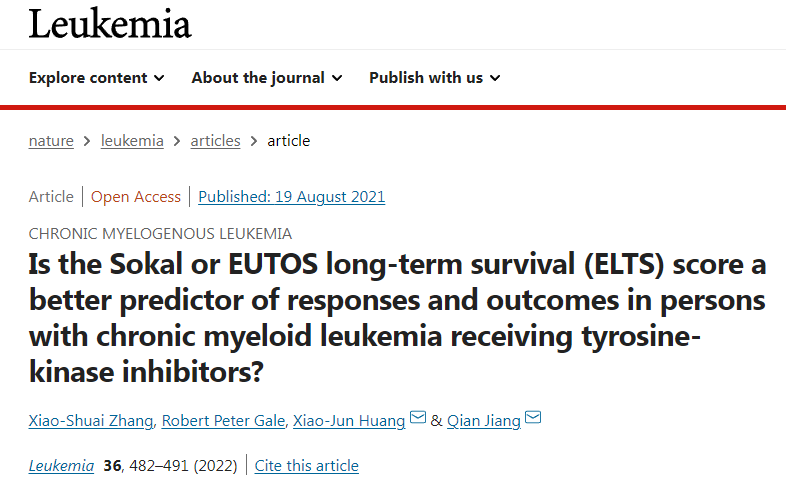Hematology | Research Team of Prof.Huang Xiaojun and Prof.Jiang Qian Reveals Better Way to Predict Treatment Response and Outcome of Chronic Myeloid Leukemia
2022-04-19
In February 2022, the research team of Prof. Huang Xiaojun and Prof. Jiang Qian of Peking University Institute of Hematology published a paper titled “Is the SokalEUTOS long-term survival (ELTS) score a better predictor of responses and outcomes in persons with chronic myeloid leukemia receiving tyrosine-kinase inhibitors?” (ELTS score is superior to Sokal score in predicting treatment response and outcome of chronic myeloid Leukemia) in Leukemia(IF:11.528), a leading international journal of hematology.

Since the advent of tyrosine kinase inhibitors (TKI), several prognostic scoring systems have been proposed to assess CML related mortality in patients newly diagnosed with chronic chronic leukemia (CML-CP), of which Sokal score and ELTS score are the most commonly used. However, there are few comprehensive comparisons of the efficacy of Sokal and ELTS scores in predicting TKI response and outcome in CML-CP patients.
The research team retrospectively analyzed 1661 cases of newly diagnosed CML-CP patients admitted to Peking University People's Hospital from January 2006 to March 2021. Data from 1661 consecutive subjects receiving initial imatinib (n = 1379)a 2nd-generation tyrosine-kinase inhibitor (2G-TKI; n = 282) were interrogated to determine whether the SokalEuropean Treatment and Outcome Study for CML (EUTOS) long-term survival (ELTS) scores were more accurate responses and outcome predictors. Both scores predicted probabilities of achieving complete cytogenetic response (CCyR), major molecular response (MMR), failure- and progression-free survivals (FFS, PFS), and survival in all subjects and those receiving imatinib therapy. However, the ELTS score was a better predictor of MR4, MR4.5, and CML-related survival than the Sokal score. In subjects receiving 2G-TKI therapy, only the ELTS score accurately predicted probabilities of CCyR, MMR, MR4, FFS, and PFS. In the propensity score matching, subjects classified as intermediate risk by the ELTS score receiving a 2G-TKI had better responses (p < 0.001~0.061), FFS (p = 0.002), and PFS (p = 0.03) but not survival. Our data suggest better overall prediction accuracy for the ELTS score compared with the Sokal score in CML patients, especially those receiving 2G-TKIs. People identified as intermediate risk by the ELTS score may benefit more from initial 2G-TKI therapy in achieving surrogate endpoints but not survival, especially when a briefer interval to stopping TKI therapy is the therapy objective.
Zhang Xiaoshuai, a graduate student at Peking University People's Hospital, is the first author of this article. Prof. Jiang Qian and Prof. Huang Xiaojun are the co-corresponding authors.
Paper Link: https://www.nature.com/articles/s41375-021-01387-y

